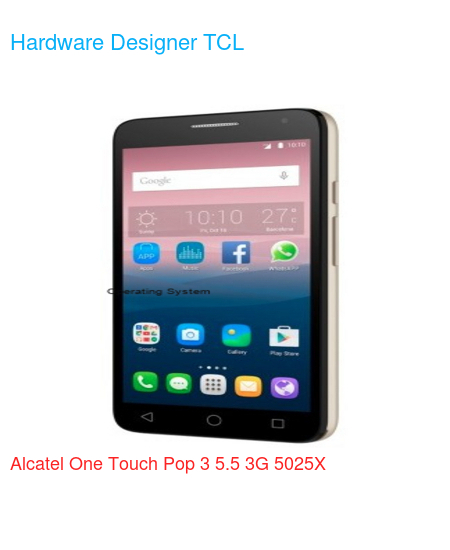| Brand | Alcatel |
| Model | One Touch Pop 3 5.5 3G 5025X |
| Released | 2015 Nov |
| Hardware Designer | TCL |
| Manufacturer | TCL |
| General Extras | Haptic touch feedback |
| Device Category | Smartphone |
| Width | 77.8 mm |
| Height | 151 mm |
| Depth | 8.95 mm |
| Dimensions | 3.06×5.94×0.35 inches |
| Mass | 150 g |
| Platform | Android |
| Operating System | Google Android 5.1 (Lollipop) |
| CPU Clock | 1300 MHz |
| CPU | MediaTek MT6580, 2015, 32 bit, quad-core, ARM Mali-400 GPU |
| RAM Type | LPDDR3 SDRAM |
| RAM Capacity (converted) | 1 GiB RAM |
| Non-volatile Memory Interface | eMMC 4.5 |
| Non-volatile Memory Capacity (converted) | 8 GB ROM |
| Display Diagonal | 139.7 mm |
| Resolution | 720×1280 |
| Horizontal Full Bezel Width | 9.31 mm |
| Display Area Utilization | 71.0% |
| Pixel Density | 267 PPI |
| Display Type | Color IPS TFT LCD display |
| Number of Display Scales | 262144 |
| Scratch Resistant Screen | No |
| Graphical Controller | ARM Mali-400MP |
| A/V Out | No |
| Microphone(s) | mono |
| Loudspeaker(s): | mono |
| Audio Output: | 3.5mm |
| Supported Cellular Bands | GSM850 , GSM900 , GSM1800 , GSM1900 , UMTS2100 (B1) , UMTS900 (B8) bands |
| Supported Cellular Data Links | GPRS , EDGE , UMTS , HSUPA , HSUPA 5.8 , HSDPA , HSPA+ 21.1 data links |
| SIM Card Slot | Micro-SIM (3FF) |
| Complementary Phone Services | Voice transmission , Voice speaker , Vibrate , Speakerphone |
| Sec. Supported Cellular Networks: | No |
| Touchscreen Type | Capacitive multi-touch screen |
| Expansion Interfaces | TransFlash , microSD , microSDHC |
| USB | USB 2.0 |
| USB Services | USB charging |
| USB Connector | USB Micro-B (Micro-USB) |
| Bluetooth | Bluetooth 4.0 |
| Wireless LAN | 802.11b , 802.11g , 802.11n |
| Wireless Services | Wi-Fi Direct , Wi-Fi Tethering |
| FM Radio Receiver | FM radio (88-108 MHz) |
| Complementary Satellite Services | A-GPS , Geotagging , QuickGPS |
| Camera Placement | Rear |
| Camera Image Sensor | CMOS |
| Number of effective pixels | 8.0 MP camera |
| Zoom | 1.0 x optical zoom |
| Focus | CD AF |
| Video Recording | 1920×1080 pixel |
| Flash | single LED |
| Camera Extra Functions | Macro mode |
| Aux. Camera Image Sensor | No |
| Aux. 2 Camera Image Sensor | No |
| Aux. 3 Camera Image Sensor | No |
| Aux. 4 Camera Image Sensor | No |
| Secondary Camera Placement | Front |
| Secondary Camera Sensor | CMOS |
| Secondary Camera Number of pixels | 5.0 MP sec. cam |
| Secondary Video Recording | 1280×720 pixel |
| Sec. Aux. Cam. Image Sensor | No |
| Built-in compass | Yes |
| Built-in accelerometer | Yes |
| Additional sensors | L sensor , P sensor |
| Protection from solid materials | Yes |
| Protection from liquids | Yes |
| Battery | Li-ion |
| Nominal Battery Capacity | 2910 mAh battery |
| Market Regions | Eastern Europe , Europe , Western Europe |
| Added | 2024-06-22 |
Specifications data description of this 📱Alcatel One Touch Pop 3 5.5 3G 5025X📱
Title: The Ultimate Specification Guide for Your Device 🌐📲
Introduction:
In today’s world, technology is constantly evolving and devices are becoming more sophisticated than ever before. Keeping up with the newest innovations can be overwhelming. That’s why we’ve put together this ultimate specification guide for your device, to help you make an informed decision before making a purchase. In this article, we’ll explore the various components that make up your device, discuss the importance of each feature, and explain how to make the most out of your technology.
Lineup:
When selecting a device, consider the various lineups available and choose the one that best suits your needs. From flagship models to budget-friendly options, there’s something for everyone.
Design:
A device’s design can make a big difference in its functionality and user experience. Things to consider include the overall size, weight, and build materials. Additionally, the display is a crucial part of the design, with factors such as resolution, brightness, and color accuracy affecting your experience. The design also includes the layout of buttons, ports, and camera placement.
Specifications:
Now let’s dive into the technical specifications of your device.
🌐NETWORK:
Your device will likely support multiple network types, including cellular, Wi-Fi, and Bluetooth connections. When considering a device, look for one with 5G or 4G LTE capabilities, along with dual-band Wi-Fi and Bluetooth 5.0 for seamless connectivity.
📅LAUNCH:
While the launch date might not seem important, it can influence the software updates, features, and support your device receives. Keep an eye on release cycles and ensure you’re investing in a device with recent hardware.
🏋️BODY:
A high-quality device should be designed with durability, ergonomics, and appearance in mind. Consider factors such as:
– Weight: A lighter device can be easier to carry around but may feel less sturdy.
– Size: Ensure the device fits comfortably in your hands, pockets, or bags.
– Materials: Look for strong materials that won’t easily scratch or shatter, such as glass or aluminum.
🌈 DISPLAY:
A vibrant display can enhance your entertainment and browsing experience. Look for the following features:
– Size: Screen sizes can range from compact 5-inch displays to spacious 7-inch displays.
– Resolution: High-resolution displays (Full HD, Quad HD, or higher) will provide sharper images.
– Brightness: Ensure your screen is easily viewable under various lighting conditions.
– Color Gamut: Displays with a wide color gamut will reproduce more vibrant and accurate images.
🤖 OS 🛠️:
The operating system (OS) is the foundation of your device’s software, with popular options including Android and iOS. When choosing a device, consider the following:
– Version: Opt for a device that comes with the latest version of the OS, with regular updates available.
– Customization: Some users prefer having the ability to customize their device’s interface.
– Security: Ensure your chosen OS includes robust security features to keep your data safe.
🚀 Chipset 🔧:
The chipset is the brain of your device, and choosing a powerful, efficient solution is essential. Consider:
– Processing Power: A higher processor frequency (GHz) indicates faster performance.
– Graphics: Some chipsets include powerful integrated graphics, while others may require a dedicated GPU.
– Efficiency: Look for chipsets with efficient power management to extend battery life.
💪 CPU 🖥️:
Multi-core CPUs improve multitasking by dividing tasks between cores. Higher core counts (e.g., octa-core) will generally result in more efficient performance.
🎮 GPU 💻:
A powerful GPU can improve gaming, video editing, and multimedia performance. Look for GPUs with higher clock speeds, numerous cores, and efficient memory management.
🧠 MEMORY 🗂️:
Memory plays a key role in device performance by storing information for short-term use. When selecting a device, consider:
– Storage Space: Devices can offer storage ranging from 32GB to 1TB or more.
– Expandable Storage: Choose a device that supports expandable storage, such as a microSD card.
– Random Access Memory (RAM): More RAM typically leads to better performance – a minimum of 4GB is recommended.
📷 CAMERA 🎥:
Invest in a device that includes an impressive camera for clear, vivid images and videos. Pay attention to the following features:
– Sensors: A larger sensor will let in more light, leading to better low-light performance.
– Megapixel Count: Although not the most important factor, more pixels can provide higher-quality images.
– Lens Quality: A higher-quality lens will have fewer aberrations and more accurate color reproduction.
– Optical Image Stabilization (OIS): Helps compensate for camera shake and motion blur.
– Video Recording: Look for devices that support high-frame-rate video capture and 4K resolution.
🔈 SOUND 🎵:
A quality audio experience can enhance media consumption and communication. Consider:
– Sound Quality: Ensure your device has clear audio and supports Hi-Res Audio if possible.
– Speaker Configuration: Some devices include dual or quad speakers for better audio separation.
– Microphone Quality: A high-quality microphone will improve audio clarity during calls and recordings.
📡 COMMS 📶:
In addition to the network discussed above, consider other wireless communication technologies:
– Navigation: GPS, GLONASS, BeiDou, Galileo, and other satellite systems help pinpoint your location.
– NFC: Near Field Communication technology enables wireless payment and data transfer with compatible devices.
💡 FEATURES 🎁:
Extra features can make your device stand out. Consider the following:
– Biometric Security: Opt for devices with facial recognition or fingerprint scanners for added security.
– Water Resistance: Check the IP rating for water resistance, such as IP67 or IP68.
– Dual SIM Cards: Some devices support two SIM cards for separate work and personal numbers.
– Fast Charging: Look for devices with fast charging capabilities to quickly recharge your battery.
– Wireless Charging: Enjoy convenient charging by placing your device on a charging pad.
– USB-C: A universal USB-C port offers faster data transfer and quicker charging than older USB technologies.
🔋 BATTERY🔌:
A long-lasting battery is essential for a device that can keep up with your busy lifestyle. Look for the following factors:
– Capacity: A larger battery capacity (mAh) typically results in longer battery life.
– Battery Management: Efficient software can extend battery life by reducing power consumption.
– Fast Charging: A device with fast-charging capabilities will save you time when recharging.
Conclusion:
With this extensive guide on the specifications of devices, you should have a better understanding of what to look for when purchasing your next device. Feel free to leave a comment below with your thoughts, questions, or recommendations for a future blog post. We always appreciate your feedback and look forward to hearing from you. 💬














